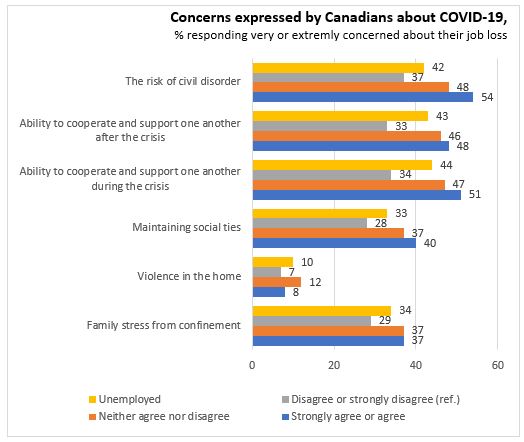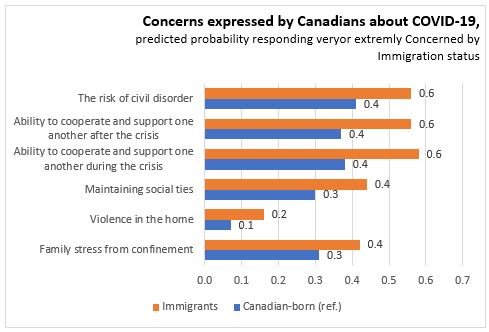The Economics and Statistics Division maintains archives of previous publications for accountability purposes, but makes no updates to keep these documents current with the latest data revisions from Statistics Canada. As a result, information in older documents may not be accurate. Please exercise caution when referring to older documents. For the latest information and historical data, please contact the individual listed to the right.
<--- Return to Archive
For additional information relating to this article, please contact:
June 02, 2020STUDY: IMPACT OF ECONOMIC CONSEQUENCES OF COVID-19 ON CANADIANS' SOCIAL CONCERNS Statistics Canada has released a study that is based on the Canadian Perspectives Survey Series (CPSS), a survey of 4,600 people in 10 provinces. As the CPSS is a subsample of the Labour Force Survey (LFS), a number of variables (age, sex, highest level of education, place of birth) were drawn from the LFS data. All of the differences presented in this release between the population subgroups are significant at the 5 per cent level (p<0.05). This study looks at the extent to which Canadians’ personal financial concerns are associated with concerns about family life and social cohesion (family stress from confinement, violence in the home, maintaining social ties, the ability to cooperate and support one another, and the risk of civil disorder). The population of interest consists of individuals aged 25 to 64, i.e., those of core working age in the labour market.
Among respondents,17 per cent of Canadians reported that the pandemic would have a major impact on their ability to fulfill their financial obligations or meet their essential needs (e.g., rent or mortgage payments, utilities, and groceries), and 30 per cent reported moderate or minor impacts. Among those who experienced major impacts from the pandemic on their ability to fulfill their financial obligations, almost half (48 per cent) were very or extremely concerned about the impacts of COVID-19 on family stress from confinement. By comparison, this was the case for one in five people (21 per cent) who did not anticipate experiencing significant financial impacts from COVID-19.
Those who reported experiencing major financial impacts were about twice as likely as those who were not anticipating these impacts to be concerned about maintaining social ties and about the ability to cooperate and support one another during the crisis. The percentage of people who reported being very or extremely concerned about the risk of civil disorder was 61 per cent among those anticipating major impacts on their ability to fulfill their financial obligations. This figure was 32 per cent among those who have no impact on their personal finances. The results of the study were generally robust. Even after other characteristics that could impact a person’s family and social concerns (e.g., age, sex and education) were taken into account, the people who were anticipating significant financial impacts were still more likely than those who were not to say they were very concerned about the social impacts of the pandemic.

Nearly one-quarter of Canadians expressed that they would likely lose their main job or primary source of self-employment income in the four weeks that followed. Canadians who were not at all worried about losing their job were generally less concerned about the social impacts of the pandemic than other respondents. For example, one-third of those who were not afraid of losing their job were concerned about the ability to support one another, whereas that was true for over half of those who had the greatest fear of losing their main job or primary source of income. When other factors such as age, sex and education were taken into account, the above differences became non-significant, which means that they were attributable to other factors.

Less-educated individuals were more likely to be concerned about the various family and social impacts of the pandemic. Nearly 60 per cent of those without a high school diploma reported being very or extremely worried about the impacts of COVID-19 on maintaining social ties, whereas approximately 30 per cent among those with other levels of education.
As the lowest levels of education were among those most at risk of losing their job (Messacar and Morissette 2020), it could follow that education plays a significant role in social concerns. A number of factors were taken into account, including fear of losing one’s job during the pandemic, those with the lowest levels of education were still more concerned than those with the highest levels of education. These results suggest that the differences described above could also be the result of differences in education levels.

Immigrants were more likely than the Canadian-born to worry about the social impacts of the pandemic (LaRochelle-Côté and Uppal 2020). This study supports these earlier findings that even after all other factors were taken into account, immigrants still worried more than the Canadian-born. Immigrants were more than twice as likely as people born in Canada to be worried about the potential of violence in the home.

Source: Statistics Canada. Study: Impact of economic consequences of COVID-19 on Canadians' social concerns
<--- Return to Archive